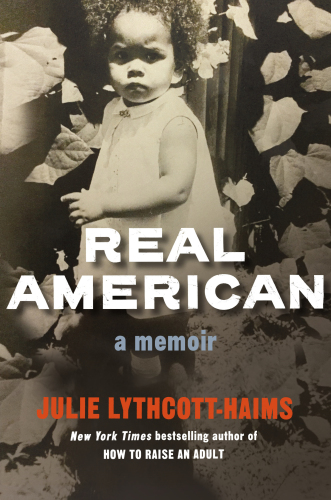
Real American
A Memoir
فرمت کتاب
ebook
تاریخ انتشار
2017
نویسنده
Julie Lythcott-Haimsناشر
Henry Holt and Co.شابک
9781250137753
کتاب های مرتبط
- اطلاعات
- نقد و بررسی
- دیدگاه کاربران
نقد و بررسی

June 26, 2017
Lythcott-Haims (How to Raise an Adult) has written a bold, impassioned memoir that explores the emotional and cultural divide imposed by American racism on people of mixed race. Born in 1967 to an African-American father and a white British mother, she was proud that her parents “broke the rules” despite the racial sneers and ridicule she experienced growing up in Palisades, N.Y., and Madison, Wis. However, the steadfast support of her loving mother and of her father, an accomplished physician appointed by President Carter as assistant surgeon general in 1977, couldn’t prepare the insecure, mixed-race teen for navigating a white world (“I don’t think of you as Black. I think of you as normal,” says one high school friend while the two were watching Gone with the Wind). Upon graduating from Stanford University (she would serve as dean of freshmen there years later), Lythcott-Haims married a white Jewish man and gave birth to “quadroon children,” which further complicated her quest for self-understanding. Later, she became empowered through her determination not to let hate define her or the lives of her children. Riveting and deeply felt, Lythcott-Haims’s memoir sheds fresh light on race and discrimination in American society.

July 1, 2017
In this open and revealing memoir, Lythcott-Haims (How To Raise an Adult) faces difficult truths head-on as she explores growing up biracial in the United States. Using powerfully effective prose, the author explains the impacts of racism on her daily life in both small and large ways, its chipping away at her feelings of self-worth. Despite earning multiple degrees from elite institutions, she spends much of her time not feeling good enough, black enough, and white enough. Instead, she feels as if she doesn't belong, wherever she tries to fit in. That is, until she finds a home at Stanford University, first as a student and later as dean of students. Encountering the term mixed for the first time while attending an undergraduate workshop on race, Lythcott-Haims begins to realize that the world is not black or white, as she had spent much of her life believing. As she finally learns self-acceptance, she also sees the importance of bringing others along on that important journey, too. VERDICT A compelling and important addition to any collection of personal narratives by women of color.--Venessa Hughes, Buffalo, NY
Copyright 2017 Library Journal, LLC Used with permission.

August 1, 2017
In a text that resembles a memoir, a prose poem, and an album of verbal snapshots, a writer from a mixed racial background chronicles her journey--and battle--to understand her racial identity.Lythcott-Haims (How to Raise an Adult: Break Free of the Overparenting Trap and Prepare Your Kid for Success, 2015), who holds a variety of academic degrees (including Harvard Law), writes about her girlhood and youth as the daughter of a black father and a white mother. Her father was a very successful man, a doctor who served as an assistant surgeon general, and her mother would earn a doctorate, as well. The author grew up in mostly white neighborhoods, an experience that delayed her determination to define and identify herself as a black woman. In a series of numbered sections whose lengths vary from a few pages to a few words, Lythcott-Haims tells not only the story of her life and considerable accomplishments, but also about current--and relatively current--issues, from the elections of Presidents Obama and Trump to the spate of police shootings of young black men. Her son is now a teen, and she, like Ta-Nehisi Coates, to whom she refers several times, worries deeply about his safety. Occasionally, the author offers lines of poetry, especially at the conclusion of a section, and her verse is blunt and stark: "We continue to try to forgive. / To live." The author also poignantly describes the assorted indignities she has endured, from attending an event at a child's school where she saw characters in blackface to resisting a Stanford colleague, a woman who fondled her hair in a meeting. She also writes affectionately about her white husband of many years--though she wonders at times what it would have been like to be married to a black man. Many potent and painful reminders that we have a long, long way to go regarding race and identity.
COPYRIGHT(2017) Kirkus Reviews, ALL RIGHTS RESERVED.

























دیدگاه کاربران